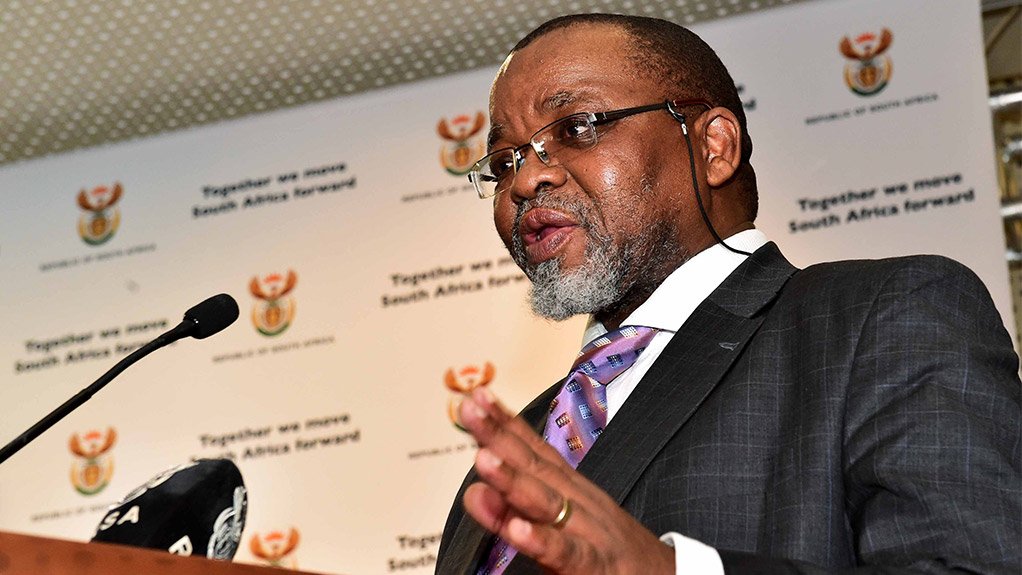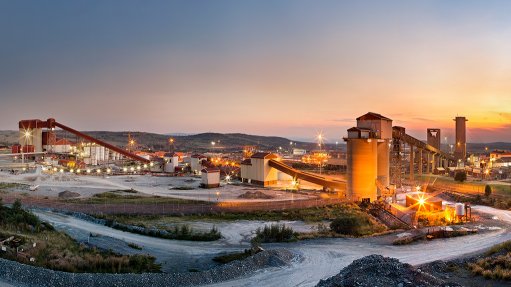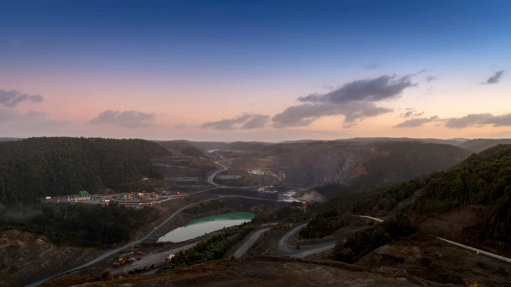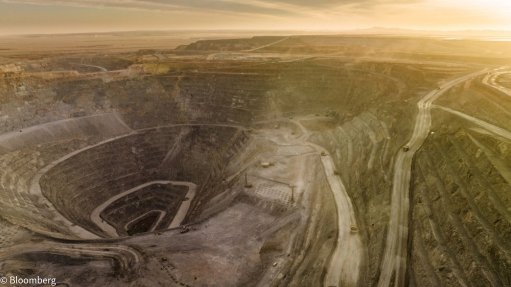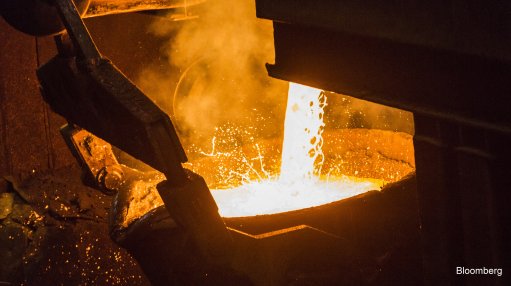Mineral resources budget prioritises exploration, beneficiation, licensing
JOHANNESBURG (miningweekly.com) – Mineral Resources and Energy Minister Gwede Mantashe on Wednesday reiterated his belief that mining was a sunrise industry, while tabling the Department of Mineral Resources’ budget vote for 2019/20 in the National Assembly.
The department has a R2-billion budget for the financial year.
Mantashe noted the department’s intention to “resuscitate” greenfield exploration to attract a minimum of 5% of the global exploration share, which amounts to about R8-billion.
“To this end, the State has deliberately decided to invest in the geoscience mapping programme, through the Council for Geoscience (CGS).”
Mantashe noted that the department had “progressed with the geo-environmental baseline study in Beaufort West, with the impending drilling of a stratigraphic borehole.”
The baseline studies will inform the creation of “appropriate monitoring and evaluation regulation” for the development of the shale gas prospects inherent in the Karoo.”
He added that while “recent judgments” had precluded the use of hydraulic fracturing, the department would seek to exploit the shale gas reserves using other methodologies.
Further, the department has set aside R20-million to improve and develop an integrated licensing system over the next two years.
“We have made significant strides in processing the backlog in licence applications, in our Mpumalanga, Limpopo and North West regions. These offices have now been reopened. Turnaround times to process licence applications are under review,” Mantashe stated.
The Minister pointed out that the R850-million allocated to the department’s science councils would also be used to support the various critical programmes, including ones centred around beneficiation.
He stressed that beneficiation “has the capacity to grow the economy and create decent employment”.
The department’s science councils, together with private and other public sector entities, were developing local resources of phosphates, a primary feedstock to manufacture fertilisers. This included the Elandsfontein phosphate deposit on the Cape West Coast, which “will significantly improve South Africa’s self-sufficiency in fertiliser feedstocks once fully operational”.
Additionally, Mantashe noted that the Molteno coalfields, which span the southern part of the Free State and a large part of the Eastern Cape, are being evaluated for their suitability as a source of coal for energy generation.
Moreover, “a programme for carbon capture and storage, to ensure continued use of coal resources in an environmentally sustainable manner, was under way”. The programme is being undertaken by the CGS and South African National Energy Development Institute.
Further, following an initial investment of R100-million, the department is investing R150-million to revive the declining ferroalloys sector – mainly ferrochrome and manganese – over the next five years.
A further investment of R120-million over five years would go to Mintek’s development of high-value diagnostic products.
“These point-of-care diagnostic test kits – for example, kits for HIV, malaria, tuberculosis and Rift Valley Fever; use nanoparticles of gold as an active ingredient. They are currently supplied to public health facilities in five provinces; and outperform commercially available products in terms of shelf life and accuracy.”
The department will also be investing in a seismic monitoring network to monitor seismic activity that may potentially affect the integrity of private, business and critical infrastructure.
It is also exploring applications of the Fourth Industrial Revolution and artificial intelligence to predict the occurrence of seismicity and land subsidence.
The department is also collaborating with the Department of Health on a project to investigate the possibility of mine hospitals extending healthcare facilities to families of mine employees and surrounding communities.
ILLEGAL MINING
On the issue of illegal mining, Mantashe noted that South Africa, and other countries, had tabled a draft resolution to the United Nations Commission on Crime Prevention and Criminal Justice during in May.
“The resolution is about combating transnational, organised crime and its links to illicit trafficking in precious metals and illegal mining, including by enhancing the security of supply chains of precious metals.”
He stressed that, “the department will work together with, and support other departments, on a national strategy to eliminate the illicit mining and trade of precious metals and diamonds”, re-emphasising that illegal mining is a criminal act.
REACTIONS
The Democratic Alliance Shadow Minister of Mineral Resources and Energy Kevin Mileham stated that the mining industry had been in terminal decline owing, in part, to inept governance and militant trade unions.
He noted that investment had dried up because investors could no longer trust the word of government, stating that the African National Congress (ANC) had deserted its promise to investors that the 26% black economic empowerment (BEE) requirement stipulated in the first Mining Charter would not change.
He said that, despite some of South Africa’s most abundant commodities – gold, palladium, rhodium – experiencing high prices, the industry could not capitalise on that because of the exorbitant costs of production, which he attributed mainly to labour costs.
The Economic Freedom Fighters’ (EFF’s) deputy secretary general Hlengiwe Mkhaliphi said the party rejected the budget and repudiated Mantashe’s “unconstitutional” withdrawal of the Mineral and Petroleum Resources Development Act Amendment Bill.
She noted the MPRDA Amendment Bill included a provision, under Section 86, for the State to automatically acquire a 20% free-carried interest in all new exploration and production rights, scoffing that the withdrawal served the interests of “capital and French oil companies”.
Mkhaliphi stated that Mantashe seemed content to “continue with the colonial practice” of exporting minerals and importing finished products, instead of using State ownership to institute a process of rapid beneficiation.
She said the EFF would table a private members Bill to amend the MPRDA to ensure that no more than 30% of the country’s mineral resources are exported.
Comments
Press Office
Announcements
What's On
Subscribe to improve your user experience...
Option 1 (equivalent of R125 a month):
Receive a weekly copy of Creamer Media's Engineering News & Mining Weekly magazine
(print copy for those in South Africa and e-magazine for those outside of South Africa)
Receive daily email newsletters
Access to full search results
Access archive of magazine back copies
Access to Projects in Progress
Access to ONE Research Report of your choice in PDF format
Option 2 (equivalent of R375 a month):
All benefits from Option 1
PLUS
Access to Creamer Media's Research Channel Africa for ALL Research Reports, in PDF format, on various industrial and mining sectors
including Electricity; Water; Energy Transition; Hydrogen; Roads, Rail and Ports; Coal; Gold; Platinum; Battery Metals; etc.
Already a subscriber?
Forgotten your password?
Receive weekly copy of Creamer Media's Engineering News & Mining Weekly magazine (print copy for those in South Africa and e-magazine for those outside of South Africa)
➕
Recieve daily email newsletters
➕
Access to full search results
➕
Access archive of magazine back copies
➕
Access to Projects in Progress
➕
Access to ONE Research Report of your choice in PDF format
RESEARCH CHANNEL AFRICA
R4500 (equivalent of R375 a month)
SUBSCRIBEAll benefits from Option 1
➕
Access to Creamer Media's Research Channel Africa for ALL Research Reports on various industrial and mining sectors, in PDF format, including on:
Electricity
➕
Water
➕
Energy Transition
➕
Hydrogen
➕
Roads, Rail and Ports
➕
Coal
➕
Gold
➕
Platinum
➕
Battery Metals
➕
etc.
Receive all benefits from Option 1 or Option 2 delivered to numerous people at your company
➕
Multiple User names and Passwords for simultaneous log-ins
➕
Intranet integration access to all in your organisation



